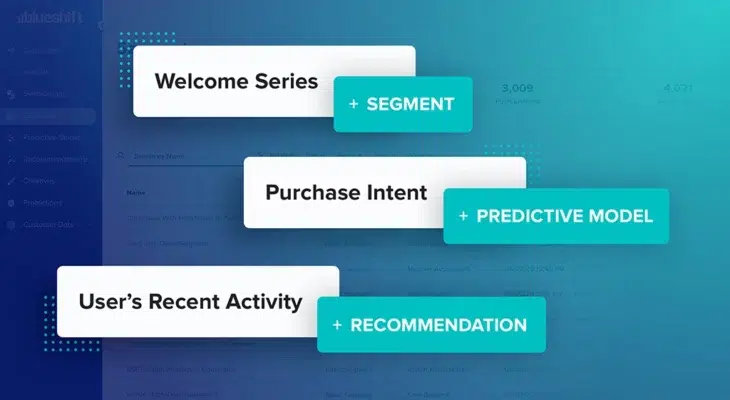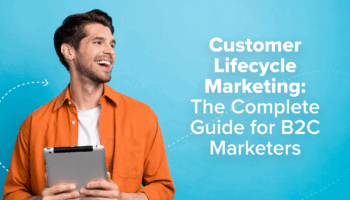In business or even life in general, shortcuts are often seen as less than. A handmade chair carved from wood will typically fetch a higher price (and more awe) than a very similar chair that was mass-produced in a large factory. Why is that? These chairs could be totally equal in quality — the factory-made chair might even be more flawless. It’s because as consumers we’ve made the connection that automation in the production of the chair means that the “personality” was taken from said chair and that the end result is a product that is un-unique, shotty, and less valuable. It could technically be untrue, but perception often carries more weight in our decision making than fact. Let’s step away from hypothetical chairs and think of marketing. Consumers crave authentic, 1:1 messaging. There exists a growing notion that automation and the scaling up of messaging precludes modern marketing from being authentic and personal. This couldn’t be farther from reality. Brands of all sizes can craft delightful and engaging experiences for modern audiences through online channels. Automation needed to message on the scale of thousands, or even millions doesn’t mean personalization and authenticity are impossible for marketers to execute.
How AI and Customer Data Are Poised to Revolutionize Marketing Automation

What is marketing automation?
Let’s first align on the basics of marketing automation:
- Marketing automation is the use of technology to send pre-determined messages to a target market, typically based on an action that someone has taken.
- Marketing automation does not mean that it is or isn’t personalized, relevant, or impactful for the target audience — and it’s not only for email marketers.
- Marketing automation shouldn’t be seen as a “four-letter” word. It is a very helpful thing when used properly by skilled practitioners. A hammer may be a bad tool in a glass shop, but it’s the perfect tool for carpentry.
Chances are, you’re sitting on a goldmine. A goldmine of first-party data. Not only is data now considered the most valuable resource in the world, but it’s also right within your reach to capitalize on a wealth of first-party data. The first step to building out a successful marketing strategy with first-party data is to start tracking all your customers. And we mean all the time, across every device, no matter where they’re located. With traditional or legacy marketing and data systems, this can be a tall, if not impossible order. But, more advanced platforms built for the 21st century have the capability to track users across all browsing scenarios and stitch together data with established user profiles.
Gradually, this method of collecting 1st party data will build a complete and up-to-date single view of your customers. With accurate information at your fingertips, automation becomes much more personable — and a lot less robotic feeling. Gone are the “hey, %first name%!” and irrelevant product suggestion errors in your messaging. Any automation you run will now be informed by a hyper-accurate database that makes your customers feel like best friends. Customer Data Platforms are the missing link between raw data and a unified view of each and every customer.
Use AI to bring humanity back into your automated journeys
It would be amazing to suggest that 1:1 personalization is possible solely with the help of a CDP, but that wouldn’t be entirely truthful. CDPs are an essential part of a martech stack that activates your customer data, but not the complete answer to that challenge. Any marketing automation platform you use won’t produce the desired outcome of authentic feeling messaging unless it’s powered correctly. 21st-century expectations of personalization need to be met with 21st-century methods of computing.
AI and machine learning-based platforms are the only sure-fire way to produce meaningful and authentic customer journeys autonomously. AI puts the human element back into automated decision making, and machine learning draws powerful conclusions about your unique customer behaviors through millions of patterns. Using these technologies enables marketers to determine which channels, times, and messages are most optimal for engagement and conversion — and on a 1:1 scale. AI can also use your first-party data to find new, high-value segments to draw in new customers who will love your brand just as much as your existing fans.
Personalized omnichannel orchestration requires smart marketing automation
In years past marketing automation was virtually synonymous with email marketing — simply because email is easy to automate, where other emerging channels were not. Luckily for marketers, this is no longer the case. Marketing automation now stretches far beyond email and is an essential tool for omnichannel marketers. Given that single-channel marketing is longer effective (multi-channel marketing is at least 283% more effective with customers) it’s time for marketers to embrace the omnichannel approach and the technology it needs to power its success. Additionally, AI-powered automation is what sets apart a great customer experience — it’s what delivers truly personalized experiences at scale. When evaluating marketing automation platforms its important to remember that you can’t drive omnichannel campaigns with single channel platforms, so make sure that your technology can meet the demands of your current campaigns, as well as the 1:1 omnichannel campaigns of your dreams.
The process of having first-party data from all of your different sources and execution channels inform how, when, and where customers are messaged is what we like to call data activation. Instead of marketers feeling bogged down by their customer data, activation allows marketers to be fully in control of how their data is used. And though marketers are fully in control of their customer data, it doesn’t mean they have to be in the weeds of journey decisioning. Blueshift’s SmartHub CDP builds self-driving customer journeys that speak to customers on an individual level with custom messaging, product recommendations, and offers.


